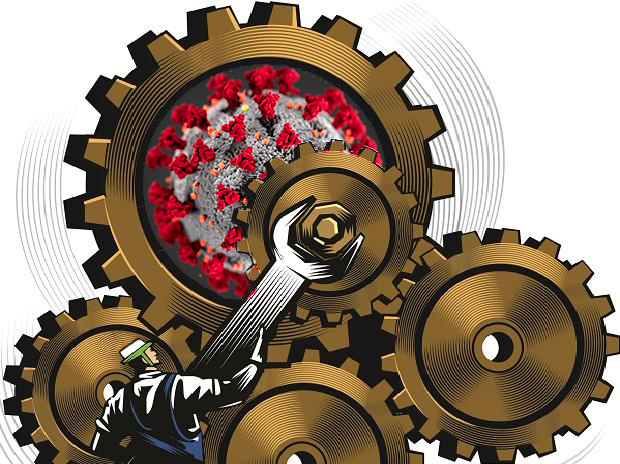Santosh Kumar Mohapatra
CoVID-19 threatens to destroy many lives and the world economy as such. The World Economic Forum (WEF) has termed it a pandemic in the age of inequality. India has declared it a ‘national disaster’. Many states, including Odisha, have declared it as ‘state disasters’.
The economic dangers CoVID-19 poses, though, are exponentially greater than its health risks. Fear of CoVID-19 are already reverberating across global economies and they may bring world economy to a standstill. OECD has predicted that the world economy could grow at its slowest rate since 2009 in the wake of the pandemic. It could push the US, Eurozone and Japan into recession and slow China down. The chilese economy lost $60 billion this quarter alone.
Bloomberg Economics estimates that besides China, other major economies such as South Korea, Italy, Japan, France and Germany affected CoVID-1 will be hit hard. Global growth for 2020 will decline to 2.3 per cent, and even dip to zero from the pre-virus consensus forecast of 3.1 per cent. The GDP of World would decline by $2.7 trillion — equivalent of the entire GDP of UK. Its repercussions may be far-reaching and severe. If China doesn’t get quickly back on its feet soon, world economy will sputter further.
The macabre dance of the coronavirus is acting as a mirror and reflects how human beings are clueless and helpless against such a pandemic. It has decimated arrogance of the rich and powerful.
In June 2019, US President Donald Trump had warned that the US would face an epic stock market crash if he was not re-elected. Now, he is clueless how to stop carnage at the stock market. Reports suggest Trump today is afraid of meeting journalists fearing infection by SARS CoV-2. He is reported to even have asked secret service to ban anyone who has a cough from White House grounds.
The virus has reminded us of our collective infirmity. Researcher David Spratt has warned in a new report that human civilisation is not prepared to survive climate change and that “no political, social, or military system can cope” with the worst outcomes of climate change.
According to Global Challenges Foundation’s 2018 report, the next 50 years will set the pace for humanity’s survival in the next 10,000 years. Global catastrophes can occur for a number of reasons. Because so much is at stake and so little has been done, caring may no longer matter if we wait any longer.
Scientists should refrain from manufacturing destructive weapons. Each country should follow the policy of disarmament. The mammoth defence budgets of many countries should be cut drastically and surplus amounts should be used to alleviate poverty, hunger and starvation of the entire world. There should be restriction on the numbers of houses purchased or constructed and number of vehicles used by a person.
The virus is a stark reminder that human life is the greatest gift of nature and should be utilised for the benefit of society and civilisation. Human beings should try and relinquish bad qualities such as vindictiveness, jealousy, arrogance, greed, hedonism and insensitiveness and imbibe the virtues of kindness, compassion, sympathy, philanthropy, morality and values. In life, importance should be given on peace, happiness and sacrifice, and not hedonism, greed or accumulation of wealth.
The obsession with GDP growth or wealth creation should be shed as all wealth can be destroyed, extinguished within a moment. Enough wealth has been created and what is important is its distribution. The important question before us is survival of the human being, human civilisation and existence of this beautiful Earth. If human civilisation becomes extinct, who will read, celebrate, rejoice our wealth, achievement, fame and glory?
The writer is an Odisha-based economist. e-Mail: skmohapatra67@gmail.com. Views are personal.
